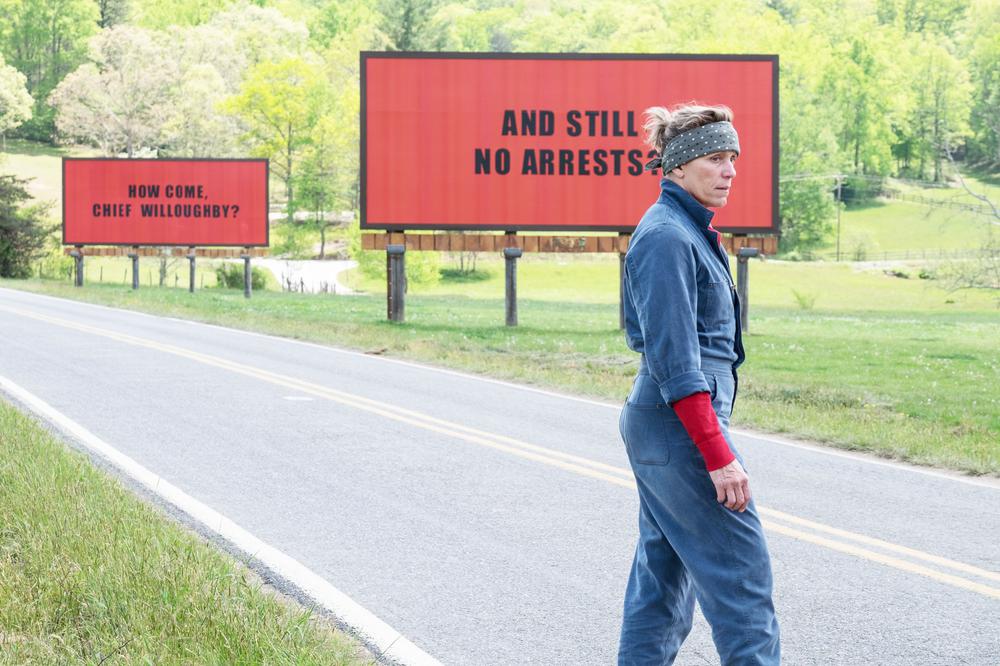Martin McDonagh has a super twisted sense of humor. In In Bruges, he openly and amusingly points out how hard it is for obese Americans to enjoy Bruges’s best attraction; in Seven Psychopaths, the character that might be a serial killer that creepily pets cats is the voice of reason. But with Three Billboards Outside Ebbing, Missouri, McDonagh adds a MUCH deeper emotional and political resonance. Grant it, I loved seeing Christopher Walken say peyote as much as the next person, but it’s even better to watch how a woman on a mission can rupture whatever flawed rules used to guide a small town. And who better to do so than a terrifying Marge Gunderson?
It’s been 7 or so months since Mildred’s (Frances McDormand) only daughter has been raped and murdered, and worse, the case has gone cold. Twisted, I told ya. Frustrated with how Chief Willoughby (Woody Harrelson) has handled the investigation, Mildred buys the 3 billboards from Red Welby (Caleb Landry Jones) to hopefully force the Ebbing police to try to pick up the trail. Willoughby takes the billboards in stride, but his underling Dixon (Sam Rockwell) is pretty pissed at Mildred, and tries to make her life a living hell. Not helping the situation is Mildred’s homelife, as her ex-husband Charlie (John Hawkes) is trying to help raise their son Robbie (Lucas Hedges), even though that marriage ended real badly.
McDonagh’s best trait is his ear and eye for a great joke, and that is on FULL display throughout here. I laughed so hard at his stuff I had a headache by the end of Three Billboards. McDonagh’s sense of humor harkens back to the classic writer goal: show, don’t tell. It’s vital that you pay attention in Three Billboards, because if you do, you’ll cry from laughing. The best example of this comes in the middle, where a character and the scene are set up to be this heartfelt moment of a character learning he needs to pay more attention to his surroundings by a friend/mentor. While this loving moment is going on, a giant fire has surrounded their building and trapped them in. McDonagh trusts his audience to pick up that a character is dumb, or conflicted, or aloof, not by having another character say it, but by the scene and dialogue showing it. Because of this, McDonagh can turn even simple phrases like “I’m going to use the little boys’ room” into hilarious punch lines.
In previous movies however, the films would start and end with the joke: there was emotion, but it was always hovering in the background. In Ebbing, Missouri, McDonagh found a point and a broken heart. Mildred has lost control of her life and everyone feels bad for her, but they have moved on, whereas she cannot. As a result, she forces everyone to remember. So the system (in this case, the whole town) lashes out against her. Why blame the victim? Such difficult thoughts as a murdered young girl do not sit well with groups of people, and they push back against the person, channeling their anger at the wrong person. There’s a bit of a not so subtle metaphor to how marginalized groups have been dealing with this concept for a long time, leaving everyone not in power jaded and pissed off and everyone in power irritated by people who they don’t understand. McDonagh has the people who have risen away from their anger help the angry figure out what to do, whether it be channel it into something productive, or just let it go. The button pushing (as well as another McDonagh trait, excessive cursing) gives Three Billboards an edge that makes the jokes pop harder, and makes the emotion well perceived and real. Mildred is a real b and c word, but she’s earned the right to be, but maybe a little too blindly.
Shout outs to this stellar cast too. Frances McDormand is a force of nature here. Her righteous, indignant anger toward what happened to Mildred makes her the movie’s eye of the hurricane. There’s great stuff happening everywhere, but McDormand is at the center. Sam Rockwell and Woody Harrelson have found homes in McDonagh movies. Harrelson gets to be a more empathetic character here, just a nice cop trying to please everyone and do his job: protect and serve. I continue to be baffled why people don’t use Rockwell more in movies. Dixon is set up to be just a horrible racist at the start of the movie, but Rockwell gives him an “aw shucks” simplicity and eagerness to learn that makes him one of the more compelling characters by the end of the film. Peter Dinklage, Lucas Hedges, and John Hawkes also contribute nicely. And nice shout outs for Kelly Condon and Samara Weaving: simpleton townie is a thankless role, but in a McDonagh film these two in like 2 scenes land just punchline after punchline.
At McDonagh’s current film rate, we’re not seeing him for another five years. Just a bummer. Come on studios! Three Billboards, is gonna get some Oscar nods. I think you should really invest in this guy and he’ll deliver something weird, but something that will make you look really cool. Don’t you want to be cool studios? Better act soon, or Netflix will poach him for a 5 movie deal. Oh wait, on second thought, ignore what I said.

